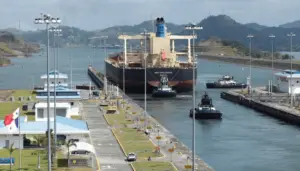 In a move that has intensified global trade tensions, Chinese regulators have obstructed the $23 billion sale of strategic port assets, including two key terminals at the Panama Canal, to a consortium led by U.S. investment firm BlackRock. This intervention underscores the intricate geopolitical dynamics influencing international commerce.
In a move that has intensified global trade tensions, Chinese regulators have obstructed the $23 billion sale of strategic port assets, including two key terminals at the Panama Canal, to a consortium led by U.S. investment firm BlackRock. This intervention underscores the intricate geopolitical dynamics influencing international commerce.
Background of the Deal
On March 4, 2025, Hong Kong-based conglomerate CK Hutchison Holdings announced plans to divest 43 port facilities across 23 countries to an investor group spearheaded by BlackRock. The proposed transaction encompassed pivotal ports situated at both entrances of the Panama Canal, a critical maritime passage facilitating global trade.
Chinese Regulatory Intervention
The deal encountered a significant hurdle when China's State Administration for Market Regulation initiated an anti-monopoly investigation, effectively stalling the transaction. Reports indicate that Chinese President Xi Jinping expressed dissatisfaction with CK Hutchison for proceeding without prior consultation with Beijing.
Further complicating matters, Chinese authorities have directed state-owned enterprises to suspend new dealings with entities linked to CK Hutchison's owner, billionaire Li Ka-shing, following his decision to sell the Panama ports.
Geopolitical Implications
The obstruction of this sale has amplified existing tensions between the United States and China. President Donald Trump had previously voiced concerns regarding China's influence over the Panama Canal, viewing the proposed acquisition by a U.S.-led group as a strategic move to reassert American presence in the region.
Conversely, Chinese state-affiliated media outlets have criticized the sale, suggesting that transferring control of such strategic assets to U.S. interests could jeopardize China's national security.
Impact on CK Hutchison and Hong Kong
The delay has also cast a spotlight on Hong Kong's business environment and its autonomy under Chinese sovereignty. Analysts warn that yielding to Beijing's pressures could tarnish Hong Kong's reputation as a global financial hub. The protracted scrutiny over the port deal reflects broader apprehensions about Beijing's increasing influence over Hong Kong's economic affairs.
China's decision to block the $23 billion sale of Panama Canal ports to a BlackRock-led consortium highlights the complex interplay between global commerce and geopolitical strategies. As the situation unfolds, stakeholders worldwide are closely monitoring developments, cognizant of the broader implications for international trade and diplomatic relations.

